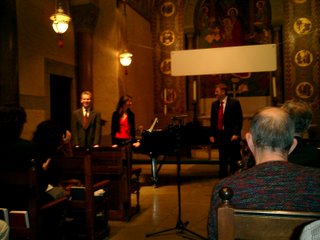Originally posted Tues 23 May 2006:Each April I am overcome by a powerful longing. A longing for two special things that Spring bestows upon us. In some years these things appear early, in other years (this year, for instance) they seem to appear later. They are: asparagus and ramps.
Everyone knows asparagus. Many grocers sell aspragus all year, but only in April does it begin to grow in this general region of America. The sweet flavor, low price, and sheer abundance of the crop make binging
de rigeur. I could easily eat asparagus every day for the full month or so of its season. I'm sure that many people share my obsession.
But ramps? They are not as widely known. They are a vegetable that is something like a cross between leeks and scallions. They have a plump, white root which sprouts a short, floppy, purplish stalk crowned with long, broad, grassy leaves. Ramps have a sharp, garlic-like fragrance and taste, but a mellower, rounder, and fresher character than garlic or scallions, with less sting. Bright and savory might be another description. Some people find them too strong. I suspect that those people don't have much of a taste for the
Allium genus in the first place.
Chacun à son goût.
According to what I read on the web (search blogs for ramps and you'll get dozens of hits) they grow from Georgia to Québec, from the east coast into the midwest. They have a big following in West Virginia, where they grow all over the place. The ramps season is even briefer than asparagus's, and because comparatively few people know about them in this country, demand is lower, and the crop is smaller. But popularity seems to have grown in the last decade. New York restaurants have put ramps on their menus and articles about them have appeared in the New York Times, granting ramps snob appeal. In fact, a Times article this season gave them a loud ho-hum, claiming that ramps are nothing to get excited about. This is a true sign that ramps have gone establishment. I'll freely admit that part of their appeal is their scarcity. Knowing that you can enjoy ramps for only a very short time each year, you appreciate them more.
My first acquaintance with ramps occurred when I spent a spring in Germany. I tasted the local variety called, "Bärlauch" (= bear leek). It grows there like weeds and is a common ingredient in springtime cooking. I did some research and found that it goes by different names in different parts of Europe, and that we have our own form in America.
The season is coming to an end now, it only lasts about three weeks. This past weekend I was still able to buy some at the Union Square Farmers Market, which is the best place around to find them. The grocery stores charge way too much. Skip Garden of Eden and Whole Foods. Fairway had a small box of limp ramps that were set up way too inconspicuously in a refrigerated shelf.
The Union Square merchant in the photo below sold them as his only item. His were fresh, lovely, and cheap. A steady stream of ramps fans approached his stand, gleefully snatching them up.

The handwritten signboard at his table has some restaurant cards tacked to it, suggesting that this man is the supplier to prominent New York chefs. Customers have scribbled recipes in magic marker onto the board, and they're all pretty appetizing to read.
You can use ramps any way you would use other types of onion-family vegetables. The entire stalk is edible, including the greens. Even though fresh ramps are a bit sharp, I've heard that they're enjoyable chopped and tossed raw into salads. Any cooking must be brief -- the flavor of ramps weakens drastically if they're cooked more than a few minutes.
Here's my favorite recipe. It's just a simple side-dish. But it's really easy and fantastic:
- Cook some brown rice. (for instance, 2 cups cooked)
- Sauté some sliced mushrooms (6-8oz) in butter and/or olive oil. Put them aside.
- Chop a healthy-sized bunch of ramps (maybe six stalks) in any fashion: I like large pieces.
- Using the same pan that the mushrooms cooked in, warm some more butter or olive oil on low-to-medium heat and sauté the ramps. Start with the chopped white roots, a minute or so is long enough. Then add the chopped stalks and leaves to the pan and keep everything moving until the leaves wilt, but are still fresh and green-looking.
- Toss the sautéd ramps and mushrooms into the rice, and add soy sauce and pepper to taste.
Mr. Supersweetie suggests sautéing some sliced ginger with the mushrooms and/or the ramps, and removing it before mixing everything into the rice. I haven't tried it yet, but I will-- I'm sure it'll be delicious!







